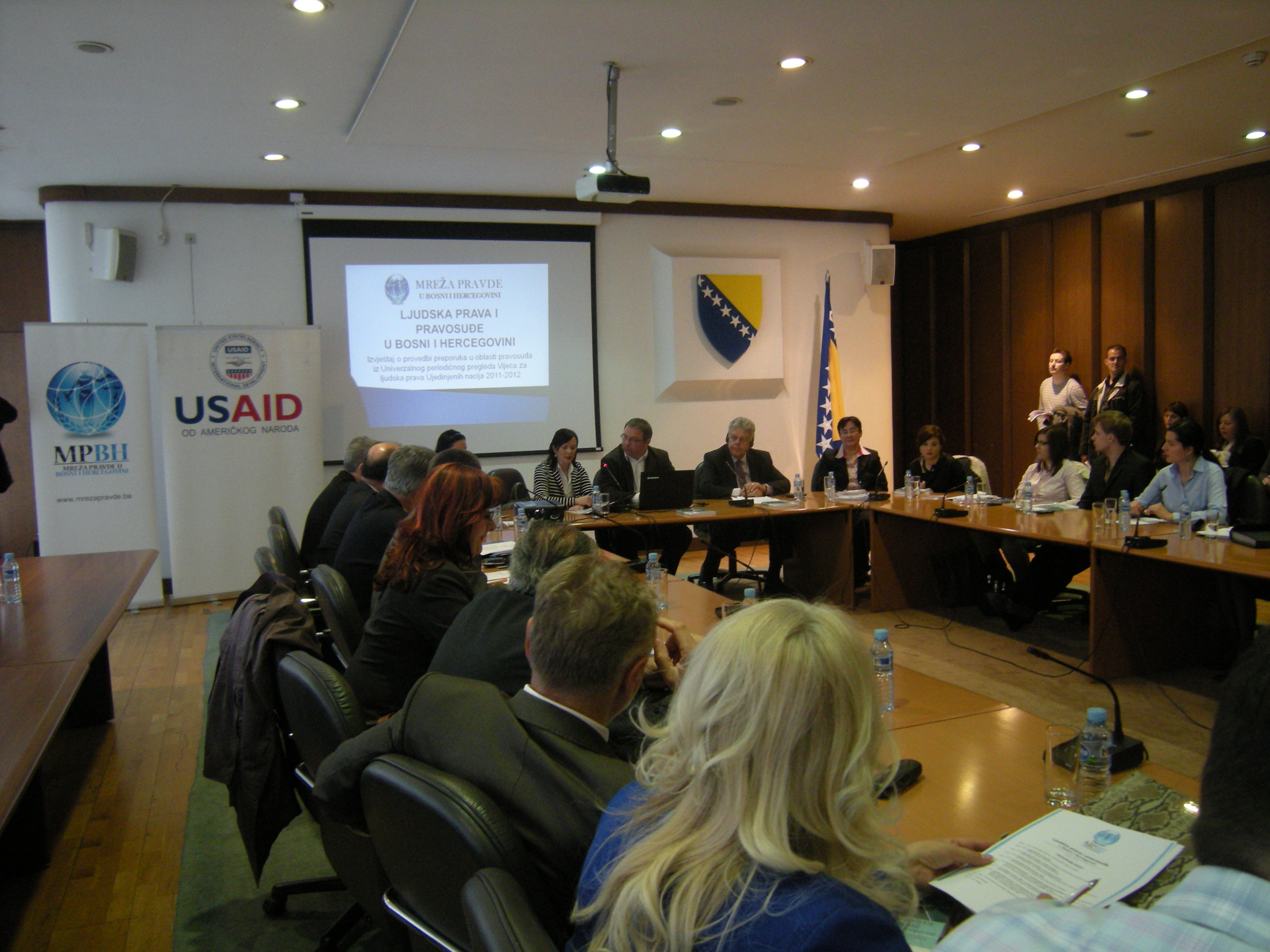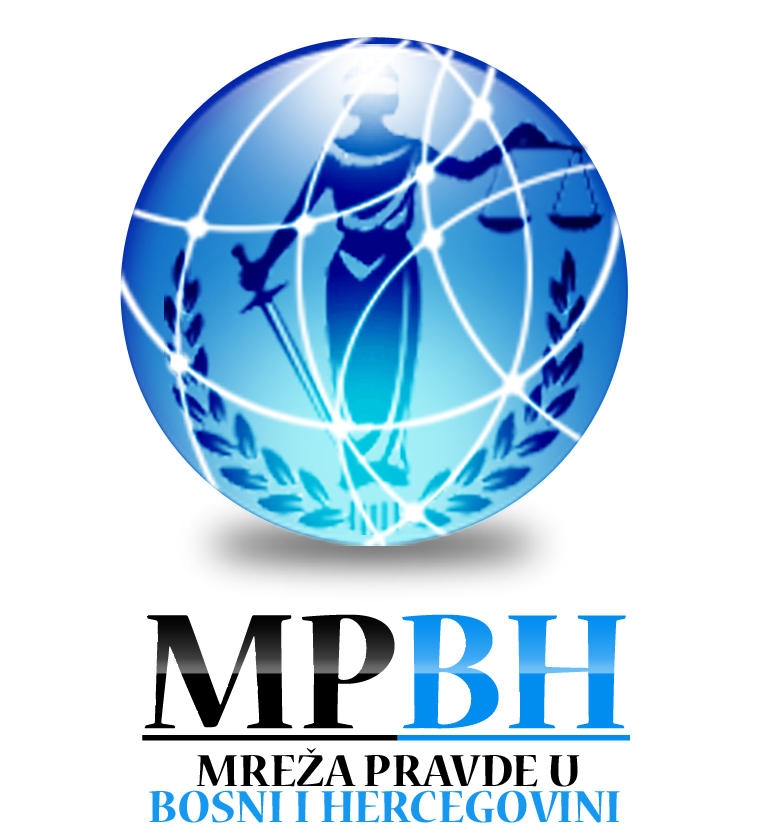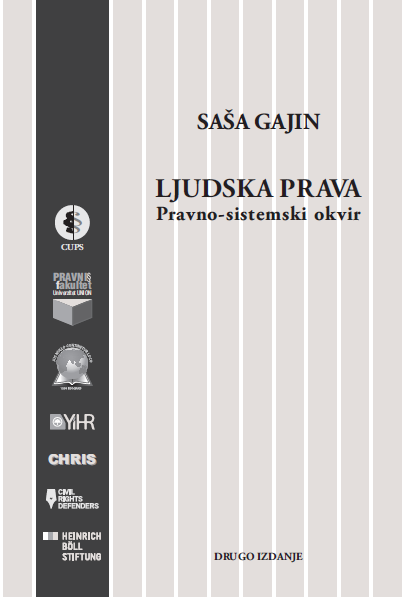The 3rd Human Rights and Justice Network Conference was held in Sarajevo on 26 April, 2012. It was organized by the Association for Democratic Initiatives (ADI) and the Human Rights Center of the University of Sarajevo, with the support of the USAID Justice Sector Project II. The conference was attended by approximately 90 representatives of the justice, executive and legislative sectors, as well as representatives of civil society and the international community in BiH.
The conference was opened by Snježana Ivandić Ninković, Director of the Association for Democratic Initiatives (ADI), and thanked all participants for the great interest in the activities of the Justice Network and the recommendations in the field of public policy in the judiciary, resulting from the monitoring activities of the members-organizations of the Justice Network. Then Mr. Gerald Meyerman, Head of USAID Justice Sector Development Project II (USAID JSDP II), spoke about the importance of the role and support of civil society in justice sector reform processes. During his introductory address, Saša Madacki, Director of the Human Rights Center at the University of Sarajevo, presented the bi-annual activities of the Justice Network in monitoring the UNHCR’s Universal Periodic Review.
In the working part of the Conference, the report of the Justice Network Human Rights and Justice in Bosnia and Herzegovina: Report on the Implementation of Recommendations in the Field of the Judiciary in BiH for the period 2011 – 2012 prepared by representatives of member organizations of the Justice Network based on monitoring over the past two years and reporting on the implementation of UN recommendations to BiH in the field of justice, which also monitors commitments and progress towards EU integration in these areas.
Therefore, Elma Demir, representative of the Association for Democratic Initiatives, first talked about the independence of judicial institutions, highlighted the problems of financing judicial institutions, influence of the executive goverment and politics on judiciary, and referred to citizens’ perceptions of judicial independence. On behalf of the authors who prepared the chapter on the Report on Independence of Holders of Judicial Functions Jasmina Omićević, representative of the Association of Expert Associates and Counselors in the Courts and Prosecutors’ Offices in BiH, presented the findings, pointing out the state of implementation of measures relating to the position of judges and prosecutors in the judicial system and the current process of appointment and election of judges, disciplinary proceedings and regulations that determine the current material status of judicial office holders. At the end of the presentation, Ms. Omićević presented a number of recommendations for improvement in order to appoint judges and prosecutors more transparently.
Maja Šoštarić from Impunity Watch presented recommendations related to the implementation of the National Strategy for Work on War Crime Cases, sanctioning wartime sexual violence, protection of witnesses in war crime cases before the courts in BiH, and adopting a National Strategy for Transitional Justice. Mrs. Šoštarić emphasized the slow implementation of reform processes in this area, slow processing of war crimes, and the need for more effective protection of witnesses in war crime cases.
Maja Sahadžić, representative of the International Law Association presented the part of the Report on Effective Protection of Human Rights through the Judiciary. This part of the report pointed out problems regarding access to justice for minorities and sanctioning trafficking in BiH. Subsequently, Milena Savić, director of the Center for Information and Legal Assistance in Zvornik, presented recommendations regarding the training of holders of judicial functions in the field of human rights and the application of international standards, and pointed to the need for more training in this area as well as the involvement of non-governmental organizations in their identification. Finally, Edina Pirija, representative of the Association of Prosecutors of the FBiH presented chapters of the Report dealing with the topic of freedom of speech and opinion and the sanctioning of hate speech, emphasizing the need for more effective legal protection of these rights.
During the discussion, participants of the Conference also emphasized the need to strengthen the protection of the rights of children in BiH, given that many are at risk, and that the situation is worsening and children will be the ones most likely to bear the consequences of the irresponsibility of those responsible for implementing reforms. The issue of discrimination against constituent minorities has also been raised, which is evident in communities where some constituent minority individuals are also discriminated against in the fields of employment, education, etc. During the discussion, it was noted that there was discrimination against deaf persons in the justice sector even though the Sign Language Act was adopted. Legal information is not published in sign language, and even the translation of daily information is delayed by several days. Also, the fact of increasing discrimination and marginalization of socially disadvantaged categories of the population, especially retired persons, drug addicts and the ill, was pointed out. For example, although the Constitutional Court of BiH ordered the Federation of BiH to pay pensions to retired people in Republika Srpska, and in accordance with an agreement signed by the entity Pension and Disability Insurance Institute’s offices in 2003, retired persons still cannot exercise their right to a pension where the contributions are paid. The discussion also highlighted the problem of low levels of citizens’ trust in judicial institutions. An academic survey recently conducted with war victims and war crimes convicts shows that the vast majority lack confidence in the judiciary and believe that court decisions are often made under political pressure. It is interesting to note that during the Conference, it was stated that pressure and interference with the work of judicial institutions were also exerted by the international community, which made it difficult for local actors to find effective solutions. The fact that the intelligence and surveillance of citizens by the intelligence services in BiH has been increasing has been pointed out, and that the need to work on the protection of privacy is needed. In addition, it has been noted that very few cases are in courts related to abuse of office, and such violations are known to be frequent. However, it was added that charges against judges and prosecutors should be substantiated, and any complaint about their work should be referred to the competent institution or the Office of the Disciplinary Prosecutor of the HJPC BiH. In order to address these issues, it has been suggested to strengthen the role of civil society organizations in the judiciary, and to strengthen the capacity of civil society organizations to respond to this task. It is particularly important to involve civil society organizations, especially professional associations, in further judicial reforms.
During the Conference, a press conference was also held, and a number of press releases in electronic media were recorded, as shown by the conducted media analysis. At the end of the Conference, a TV documentary “Independent Justice in BiH: Justice in the Service of Citizens” was aired on April 13, 2012 at 7:45 PM on BHTV1, produced by the Association for Democratic Initiatives (ADI) and the Center for Human Rights of the University of Sarajevo – on behalf of the Justice Network – with technical support from the USAID Judicial Sector Reform Project (USAID JSDP II).



